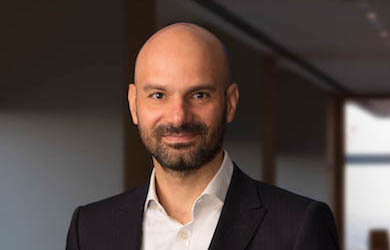
For ABANA’s January 2023 Spotlight, we sat down to speak with ABANA Vice-Chair, and Goldman Sachs Chief Credit Strategist, Lotfi Karoui. He shared a little about his own career journey, the state of the industry, and where he sees the markets – and ABANA – headed in the future. We hope you enjoy!
ABANA: Could you tell us a little about your current role?
LOTFI: I am Chief Credit Strategist at Goldman Sachs. I represent the firm’s official views on credit markets. Defined broadly, this includes corporate credit markets in the US and in Europe. I joined Goldman in 2007, right after I finished my PhD. Goldman was my first job. I was sort of born and raised at Goldman Sachs, it’s the only firm I’ve worked for, I joined as an associate and over the years got higher in seniority.
ABANA: How would you say your upbringing and your experience globally has aided you at Goldman or in the financial industry as a whole?
LOTFI: If you had asked me 20 years ago, ‘do you think you’re going to end up working in New York at Goldmans Sachs?’ I probably would’ve laughed at you. And that’s sort of the beauty of life, you don’t know where you’re going to end up. But deep down, I’ve always wanted to learn more about financial markets. And that was probably what pushed me to do a PhD.
By the end of my PhD, I looked back and I thought, there’s still a fair amount of learning that needs to happen. Typically the decision that you have to make once you graduate is to either pursue an academic career, and the vast majority of people do that, or choose a different path and work in the financial services industry. I decided to go with the latter, primarily because I wanted to solve “real life” problems. There were a lot of things that I learned in grad school that still felt abstract to me. I had written my dissertation on fixed income markets and credit markets in particular. In 2007, we had a big credit crisis that eventually morphed into a global financial crisis a year later. The environment was of course very stressful, since this crisis did pose an existential threat to many large financial institutions. But as a learning experience, it was fascinating to put into practice all the theoretical concepts that I had learned in the prior years.
ABANA: How have you balanced your life and your work? Has the approach to work-life balance changed since you joined the industry?
LOTFI: I would say things have gotten better, and some of this improvement may reflect a generational shift. That being said, my advice to someone who’s just getting started is, you have to work hard. You have to think of the first two to three years of your career as the foundations of whatever comes next. That is going to require long hours, a lot of work, and it’s a constant balance to find the right tradeoff between what you want to do and what is required by the job.
My other advice is to work hard, play hard. Take time off, take the time to recharge your batteries, be strategic about that, manage it proactively. And I’m not great at it, just to be clear. I think I’m part of a global financial crisis generation, where it’s very, very hard for me to get disconnected and put down my phone.
ABANA: From your vantage point, where are credit markets headed, in the US and in the MENA region?
LOTFI: I do think we’re going through a little bit of a paradigm shift. The post global financial crisis period was a period that featured a generally accommodative stance of monetary policy globally, subdued inflation and moderate growth. Financial assets, on the other hand, had a great run delivering higher returns than historical norms, particularly in the equity market. In some ways, we had low inflation in the real economy and elevated inflation in financial markets. We are in the opposite situation today: high inflation in the real economy that has fueled a very aggressive tightening of monetary policy and weighed heavily on risk appetite in financial markets. Until the tradeoff between inflation and the stance of monetary policy shows convincing signs of improvement (i.e., decelerating inflation and less restrictive monetary policy), financial markets are likely to remain constrained. We are making some progress but there’s a long way to go.
Now with respect to the MENA region, I think that there’s a fair amount of heterogeneity. Broadly speaking, you can divide the region into commodity producers and commodity consumers. The producers will continue to perform well, considering the significant cash windfall from rebounding commodity prices over the past two years as well as current market conditions. On the other hand, the consumers will likely continue to face a confluence of headwinds, including scars from the pandemic, higher funding costs in debt capital markets, slower global growth and a strong dollar.
ABANA: How can young ABANA members adjust to this environment, and take advantage?
LOTFI: First and foremost, stay informed. It really matters to be on top of your game, read as much as you can. Second, strengthen your “social capital”. I think ABANA is a fantastic platform, in terms of the network that it offers to its members. Use it to your advantage as much as you can. Third, be patient and remember that your career is a marathon, not a sprint. Setbacks and challenges are part of a normal learning curve, and should not be reasons to pivot and move on too quickly. Fourth, embrace a learning and growth mindset in whatever you decide to pursue. Don’t stay in your comfort zone. Fifth, avoid groupthink. Choose a career path based on what you enjoy as opposed to what’s “trendy” among your peers. Ultimately, you will only succeed if you like what you do.
ABANA: What are your goals for your career moving forward?
LOTFI: I think the most important thing for me is to always have fun and learn. The intellectual stimulation is something that matters a lot to me. One of the many appeals of the financial services industry, especially on the market side, is that there’s always new developments that challenge you intellectually where you can look back and say, I hadn’t thought about that, why is the market doing what it’s doing now?
ABANA: As an ABANA board member, how do you see the association evolving in the future?
LOTFI: That’s a very tough question, and one I’ve been wrestling with for many, many years. In a nutshell, I do think that since ABANA was founded, almost 40 years ago, the world has changed dramatically. Back then, the region didn’t have a very well-developed financial services industry. The bread and butter of the organization was to actually leverage up whatever capabilities we had in the US to the region. That is not the case anymore. You just go to Dubai, you go to Abu Dhabi, you go to Riyadh, there’s been a lot of progress in terms of growing the financial services industry, things have changed materially.
Where I personally see the organization evolving is not so much in connecting people in the US with people in the region because most large US financial services companies do have boots on the ground. I think the mission of the organization should evolve, the trip should be the other way around. I think the mission of the organization should be to connect people in the region to people in the US. That’s one path that I think going forward we need to make sure that we fulfill.
The other thing I think is that there’s huge untapped potential within the younger population. I’ve been a big proponent of trying to have more impact on students and young professionals, and make sure that we have a generational continuity. I think we’ve done a nice job over the years, but there’s certainly more that we can do, in providing that pool of our members with the right advice and again, connecting them with people.
ABANA: Lastly, how do you try to unwind and take advantage of New York?
LOTFI: There are a couple other things that I like. One of my hobbies is to read a lot on the weekends about macro and markets. We’re basically in the business of helping people think, solve real life problems. There’s rarely a shortage of issues and problems to think about: every day there’s a new thing that happens. Aside from that, one of my favorite activities is to just go to Central Park and run. We’re very lucky to have a park like that. I’m also a foodie. I think New York is extraordinary in terms of the variety of restaurants that it gives you, both in and outside of Manhattan. It’s remarkable how, in spite of the pandemic, the City has managed to preserve its edge in the restaurant industry.
Lotfi is the chief credit strategist of Goldman Sachs. He is responsible for research and views on global credit markets. He joined Goldman Sachs in 2007 and was named managing director in 2015. He publishes regularly on the state of fixed income markets and asset allocation. Prior to joining the firm, Lotfi taught undergraduate and graduate level courses in finance and operations research at McGill University and HEC Montreal.
Lotfi’s academic research spans fixed income markets, interest rate models and macro-finance. It has been recognized with awards from the Financial Mathematics Institute of Montréal and published in a number of leading academic journals such as the Journal of Economic Dynamics and Control, the Journal of Financial Economics, the Journal of Derivatives, and Management Science.
Born and raised in Tunisia, Lotfi graduated from the Institut des Hautes Études Commerciales in Carthage, Tunisia with a Bachelor degree in finance in 2000. He earned a Master’s degree in Financial Engineering from HEC Montréal in 2002 and a PhD in Financial Economics from McGill University in 2007. He is fluent in Arabic and French.
